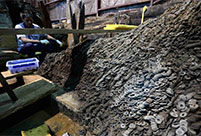

A once-a-day drug to prevent infection with HIV works in real world settings, experts have said.
Clinical trials testing the efficacy of pre-exposure prophylaxis medication, or PrEP, have produced encouraging results.
But, a new study, conducted at sexual health clinics, found only two new HIV infections occurred among patients taking the drugs.
Researchers note that at the same time, rates of STIs and condomless sex remained high, adding to the evidence in support of the drug's ability to prevent HIV.

A new study has revealed the PrEP drug Truvada does help prevent HIV infection in gay men, bisexual men and transgender women. Past clinical trials have found the drug to be 90 per cent effective, but this marks the first time it has been tested in a real-life setting, with visitors to sexual health clinics taking part
Dr Albert Liu, of the San Francisco Department of Public Health, said: 'There were a number of clinical trials that looked at PrEP and showed it to be safe and effective in that research setting.
'But, there was little information on how PrEP would be implemented outside of those research trials.'
To gather real-life information about the drugs' effectiveness, Dr Liu and his team enrolled 557 gay and bisexual men and transgender women at two sexual health clinics in San Francisco and Miami, and a health clinic in Washington DC.
All participants were prescribed a drug called Truvada for a period of 48 weeks.
Truvada, manufactured by Gilead, is a combination of two drugs, known as tenofovir and emtricitabine and was approved by the Food and Drug Administration in 2012, as PrEP to prevent HIV infections.
Initial trials found it to be 90 per cent effective in preventing HIV infections among gay and bisexual men and transgender women who consistently took the daily pill.
As well as a daily dose of Truvada, the participants in Dr Liu's study were also tested for HIV, given counselling and check-ups.
Around 79 per cent of participants completed the study.
The researchers also took blood samples from 294 participants to check how often they took Truvada.
Of those who gave blood samples, 80 to 86 per cent had levels of the PrEP drug high enough to say they were taking the drug at least four times a week.
Two participants were ultimately diagnosed with HIV, but both had low levels of the drug in their system, suggesting they were not taking it regularly.
Dr Liu said: 'We did not see infections among the cohort who had higher drug levels.'
At most of the clinics, HIV infection rates had been above two per cent, but the infection rate for the new study was lower than 0.5 per cent, Dr Liu told Reuters.
'I think the results of this study are very encouraging for the PrEP field, but we have much work to do,' he said.
The authors noted, people in Miami, and African-Americans, were less likely to have protective levels of the drug in their system.

Of 294 participants taking part at clinics in San Francisco, Miami and Washington DC, only two were ultimately diagnosed with HIV after 48 weeks of taking Truvada. Researchers noted both had low levels of the drug in their system, suggesting they were not taking it as regularly as other participants
In a research letter published in the same journal, a separate team reports that PrEP awareness and uptake among the black community is low.
Dr John Schneider of the University of Chicago and colleagues interviewed 622 young black gay and bisexual men from the south side of Chicago in 2013 and 2014, about their PrEP awareness and use.
Of those who were not already infected with HIV, only about four percent were using PrEP. About 41 percent overall had heard of PrEP, and about 12 percent knew people who used it.
It's critical for healthcare providers and public health officials to 'engage this special population in ways that (are) culturally appropriate,' Schneider told Reuters Health.
William Nazareth of the Callen-Lorde Community Health Center in New York City said the new findings give insight to those outside LGBT healthcare, like religious and non-service-based community organizations.
'Those are the places that need to understand and start promoting PrEP,' said Nazareth, who was not involved with the new research, but built Callen-Lorde's PrEP program.
'PrEP may not be for everyone, but it's really important that everyone learn about it,' he said.
Dr Liu and colleagues' findings are published in JAMA Internal Medicine.
 J-10B fighters with homegrown engine in test fligh
J-10B fighters with homegrown engine in test fligh Photos of U.S. Navy intruding in South China Sea released
Photos of U.S. Navy intruding in South China Sea released Cats who immediately regretted their life choices in photographs
Cats who immediately regretted their life choices in photographs Beautiful girl from police college becomes Internet hit
Beautiful girl from police college becomes Internet hit 10 tons of copper coins unearthed in 2,000-yr old tomb
10 tons of copper coins unearthed in 2,000-yr old tomb In Pics: Amazing Chinese fighters
In Pics: Amazing Chinese fighters
 Chinese, U.S. navies hold first-ever joint exercise in the Atlantic
Chinese, U.S. navies hold first-ever joint exercise in the Atlantic When a Chinese woman marries an Indian man
When a Chinese woman marries an Indian man Photos of beautiful teacher hit the Internet
Photos of beautiful teacher hit the Internet Top 20 hottest women in the world in 2014
Top 20 hottest women in the world in 2014 Top 10 hardest languages to learn
Top 10 hardest languages to learn 10 Chinese female stars with most beautiful faces
10 Chinese female stars with most beautiful faces China’s Top 10 Unique Bridges, Highways and Roads
China’s Top 10 Unique Bridges, Highways and Roads A traditional solution
A traditional solution Unwanted for marriage
Unwanted for marriage Joint efforts needed to shield citizens abroad
Joint efforts needed to shield citizens abroad Chinese employers up the ante for foreign hires
Chinese employers up the ante for foreign hiresDay|Week